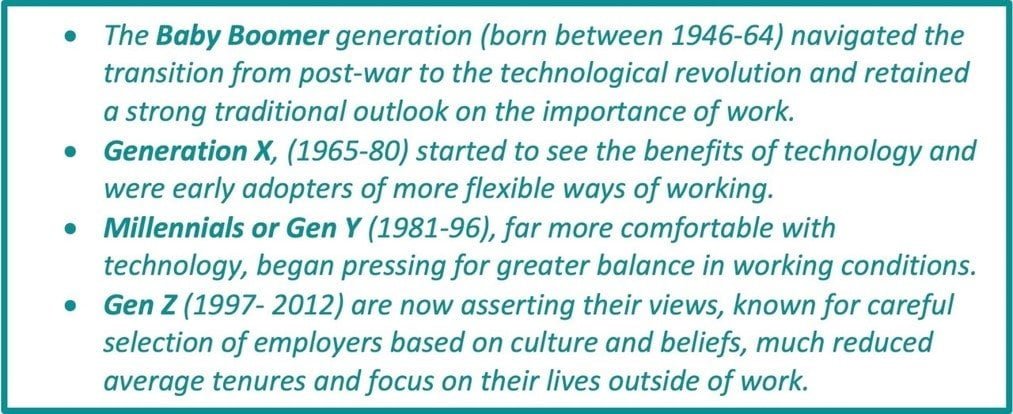Understanding the Quiet Quitting Conundrum
You may have noticed the recent rapid growth in vocabulary and jargon related to working. We’ve had WFH (Working From Home), hybrid working, the great resignation, the great return, quiet firing, quiet quitting, and employee/ employer ghosting just to name a few.
One in particular “quiet quitting” (also linked to “ghosting” or “quietly disappearing,”) refers to the practice of an employee changing their attitude toward work. Despite the name, this concept is not actually connected to quitting a job outright but making the conscious decision to not go above and beyond. The employee contains levels of commitment and engagement, sticking rigidly to their hours of work (as previously termed ‘working to rule’.).
It is believed that quiet quitting was adopted from a trend that developed in China termed “tang ping” the literal translation is “lying down”. It’s a workforce attitudinal rebellion against incessant demands for greater effort, longer hours, and improved output all without additional rewards.
Employers in the west have experienced a similar phenomenon and it’s understandably concerning, not least when the trend seems to be growing and the UK enters a period of economic uncertainty.
Quiet quitting can be particularly frustrating for employers, given the potential disruption to their business operations and the knock-on effect for colleagues, noting the “dialled back” approach of co-workers. The perceived reduction in effort suggests it will directly impact the company’s productivity. When an employee suddenly decides to reduce their engagement, it can create a sense of unease within management and worries over the possible trend developing into a company-wide issue.
The current trend of quiet quitting seems most prevalent amongst Gen Z who’ve noted the impact of work on their parents, relatives and others, and decided that they don’t want to suffer the same negative impact of stress and burnout. Work is obviously important from a practical perspective but it’s not what defines this generation, they have more pressing concerns that will impact their quality of life such as the future of the planet.
So, instead of viewing quiet quitting as a lack of professionalism and respect, we should perhaps reflect on the generational differences within the workplace. It would be far more productive to communicate in a way that ensures the needs of the business can be understood without turning to punitive measures to bring errant workers in line.
Employers who are more understanding and supportive, and even offer assistance or resources to help employees through difficult times will be more likely to retain and attract future talent.
Often one of the primary concerns of an employee, exhibiting quiet quitting traits, is the fear of burning out, being overburdened, over-stretched or under-resourced. This is when a supportive assessment of their role, objectives and outputs would be time well spent. By checking in with the employee you can start to understand the employees thinking, motivations and perceptions of work, whilst also considering the following:
- Are your expectations for the role and outputs realistic in the environment you’re currently working in? (Remember we are living in very challenging times and a great deal can change in a short period of time.)
- Are there measures you could adopt to support the member of staff?
- Would the addition of updated equipment, software, and/or training help?
The above are actions you can take directly, that can help address any shared concerns over their work but it may be worth addressing the “softer skills” and engagement between managers and colleagues. This will help identify any underlying issues that a new PC or course wouldn’t necessarily fix.
Have you considered the following?
- How does the employee present to others in the workplace, has there been any negative feedback?
- If they have a customer-facing role has that attracted any points of concern or positive feedback?
- Have there been any deadlines missed, projects delayed, meetings disrupted or role-specific requests turned down by the employee?
Following this analysis, you should provide an opportunity to share your findings and ask for their response. This would be the time to reiterate the culture of the organisation and what you expect as a “standard” from all employees by way of respect and engagement. Be mindful in such discussions of any member of staff who is either openly diagnosed or exhibits behaviours suggesting they are neurodivergent.
Ensuring employees are engaged starts from day one and an effective induction and onboarding process can set the expectations and reinforce the organisational culture. By also having effective recognition and reward strategies will ensure that employees know how well they are doing and keep them motivated in their roles.
So, in conclusion, quiet quitting can be a frustrating and disruptive experience for employers and lead to disruptions in workflow, increased costs, and damage to employee morale. The good news is that employers can remedy this by creating a positive environment, and processes that engage the workforce, fostering open communication to prevent employees from feeling compelled to withdraw without notice. Essentially, we should try to understand the underlying reasons that led to the employee’s decision and see if they can be addressed before they are no longer quiet and just quit.
If this is a topic you would like to discuss in greater detail or you would like assistance in developing ways to engage your employees, you might benefit from our EARS.
As a firm we like to listen and really hear our clients before we provide the most appropriate advice. EARS stands for “Employer Audit and Review Service” We’re currently running a limited period offer where you could book our EARS for free for an initial one-hour session.
To access the free hour please contact me, Lucy Cotterell Email lucy.cotterell@mogersdrewett.com call 01225 750063 or complete the call-back form below.





